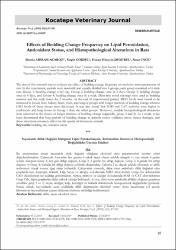Effects of bedding change frequency on lipid peroxidation, antioxidant status, and histopathological alterations in rats
Citation
Arslan Acaröz, D. , Goksel, E. , Demırel, H. H. & Ince, S. (2019). Effects of Bedding Change Frequency on Lipid Peroxidation, Antioxidant Status, and Histopathological Alterations in Rats . Kocatepe Veterinary Journal , 12 (1) , 97-102 . DOI: 10.30607/kvj.492629Abstract
The aim of this research was to evaluate the effect of bedding change frequency on oxidative stress parameters of
rats. In the experiment; animals were randomly and equally divided into 4 groups, each group consisted of 6 male
rats. Group 1; bedding change every day, Group 2; bedding change once in 2 days, Group 3; bedding change
once in 4 days, and Group 4; bedding change once in a week. Dust-free wood shavings were used as bedding
material and the study lasted for 2 months. At the end of experimental period, MDA levels were found to be
increased in blood, liver, kidney, heart, brain, and lung of groups with longer intervals of bedding change whereas
GSH levels of these tissues were decreased. It was also found that SOD and CAT activities were higher in
erythrocyte and lung tissues in Group 1 than the other groups. Moreover, notable histopathological alterations
were observed in the tissues of longer intervals of bedding change (especially, group 3 and 4). As a result, it has
been determined that long periods of bedding change in animals causes oxidative stress, tissues damages, and
these alterations adversely affect the life quality of laboratory animals. Bu araştırmanın amacı sıçanlarda altlık değişim sıklığının oksidatif stres parametreleri üzerine etkisi
değerlendirmektir. Çalışmada hayvanlar her grupta 6 erkek sıçan olacak şekilde rastgele ve eşit olarak 4 gruba
ayrıldı. Gruplar: Grup 1; her gün altlığı değişen, Grup 2; 2 günde bir altlığı değişen, Grup 3; 4 günde bir altlığı
değişen ve Grup 4; haftada bir altlığı değişen şeklinde oluşturuldu. Çalışma 2 ay olacak şekilde planlandı ve altlık
malzemesi olarak tozsuz ağaç talaşı kullanıldı. Çalışmanın sonunda, daha uzun aralıklarla altlık değişimi olan
gruplarda kan, karaciğer, böbrek, kalp, beyin ve akciğer dokularında MDA düzeylerinin arttığı, bu dokulardaki
GSH düzeylerinin ise azaldığı görülmüştür. Ayrıca, eritrosit ve akciğer dokularında SOD ve CAT aktivitelerinin
Grup 1'de, diğer gruplardan daha yüksek olduğu belirlendi. Ayrıca, daha uzun aralıklarla altlıkları değişen grupların
(özellikle grup 3 ve 4) beyin, akciğer, kalp, karaciğer ve böbrek dokularında histopatolojik değişiklikler gözlendi.
Sonuç olarak, hayvanlarda uzun aralıklarla altlık değişiminin oksidatif strese, doku hasarlarına yol açarak
laboratuvar hayvanlarının yaşam kalitesini olumsuz etkilediği belirlenmiştir.
Source
Kocatepe Veteriner DergisiVolume
12Issue
1URI
https://dergipark.org.tr/tr/pub/kvj/issue/41700/492629https://doi.org/10.30607/kvj.492629
https://hdl.handle.net/11630/9159
Collections
- Cilt 12 : Sayı 1 [16]
- Makaleler [63]



















